Donald Meichenbaum – New Developments in the Treatment of PTSD, Complex PTSD and Co-Occurring Disorders: Ways to Bolster Resilience
$219.99 Original price was: $219.99.$43.00Current price is: $43.00.
[Instant Download] – You will receive instant download access after the purchase
- Faculty:
- Donald Meichenbaum
- Duration:
- 5 Hours 50 Minutes
- Format:
- Audio and Video
- Copyright:
- Mar 10, 2017
Description
| Manual (12.55 MB) | 135 Pages | Available after Purchase |
Outline
THE NATURE AND IMPACT OF TRAUMA EXPOSURE: THE “UNTOLD STORY” OF RESILIENCE
- Controversies in the field of PTSD and Complex PTSD: “State of the Art”
- What distinguishes the 75% of individuals who evidence resilience VERSUS the 25% who develop persistent PTSD and related co-occurring disorders and adjustment difficulties
- The nature and neurobiology of resilience: Implications for assessment and treatment
- Constructive Narrative Treatment Perspective: How to help clients develop “healing stories” and accompanying coping strategies
- What resilient individuals DO and do NOT do
- A Case Conceptualization Model of risk and protective factors that informs treatment decision-making
SPECIFIC EVIDENCE-BASED INTEGRATED TREATMENT APPROACHES FOR CLIENTS WITH COMORBID DISORDERS
- The Core Tasks of Psychotherapy: What “EXPERT” therapists do
- PTSD is more than a Fear-based Anxiety Disorder: The role of guilt, shame, disgust, anger, prolonged and complicated grief and moral injuries
- Detailed clinical examples of INTEGRATED treatment with clients experiencing a variety of clinical disorders
- Prolonged and Complicated Grief Disorder
- Borderline Personality Disorder
- Suicidal behavior
- Substance abuse disorder (including how to integrate 12 AA step programs and ways to enhance Recovery Transition Coping skills)
- Traumatic Brain Injuries and PTSD
-
HOW TO IMPLEMENT THE CORE TASKS OF PSYCHOTHERAPY
- Develop, maintain and monitor a therapeutic alliance
- Treatment-informed feedback
- Collaborative goal setting using Motivational Interviewing to nurture hope and positive emotions
- Psycho-education using a CLOCK metaphor
- Teach intra- and interpersonal coping skills: Intervention guidelines on ways to increase the likelihood of treatment generalization
- Bolster the client’s resilience in six domains: physical, interpersonal, emotional, cognitive, behavioral and spiritual
- Integrate spirituality and psychotherapy
- Address the needs of health care providers: Ways to bolster “vicarious resilience”
PRESENTATION OF A CLINICAL TOOL BOX TO BE USED IN YOUR PRACTICE
- Detailed CLIENT-BASED Checklists
- Coping strategies with Grief
- Transition Recovery strategies from substance abuse
- Consumer guidelines on how to evaluate treatment centers
- 12 step AA checklist
- Spirituality-based activities assessment and others
-
Faculty

Donald Meichenbaum, Ph.D. Related seminars and products: 7
Research Director
The Melissa Institute
Don Meichenbaum, Ph.D. is Distinguished Professor Emeritus from the University of Waterloo. Ontario from which he took early retirement 20 years ago. He is presently Research Director of the Melissa Institute for Violence Prevention in Miami (Please see www.melissainstitute.org). He is one of the founders of Cognitive Behavior Therapy.
In a survey of clinicians reported in the American Psychologist, he was voted “one of the ten most influential psychotherapists of the 20th century.” He has received a Lifetime Achievement Award from the Clinical Division of the American Psychological Association and he was Honorary President of the Canadian Psychological Association.
He has presented in all 50 U.S. states and internationally. He has published extensively and most recently published Roadmap to Resilience: A Guide for Military Trauma Victims and Their Families (visit www.roadmaptoresilience. org). His other books include Treatment of Individuals with Anger Control Problems and Aggressive Behavior; Stress Inoculation Training; Facilitating Treatment Adherence; and The Unconscious Reconsidered.
He has consulted for various populations including veterans’ hospitals, the National Guard, psychiatric treatment centers for children, adolescents and adults, treatment center for individuals with traumatic brain injuries, torture victims, Native populations, deaf populations and school boards. See papers by Dr. Meichenbaum on www.melissainstitute.org (go to home page and click on Author’s Index and scroll to Meichenbaum).
Speaker Disclosures:
Financial: Donald Meichenbaum is Research Director of the Melissa Institute for Violence Prevention and Treatment. He is the Distinguished Professor Emeritus for the University of Waterloo, Ontario, Canada. Dr. Meichenbaum receives a speaking honorarium from PESI, Inc.
Non-financial: Donald Meichenbaum has no relevant non-financial relationship to disclose.
Delivery Method
– After your purchase, you’ll see a View your orders link which goes to the Downloads page. Here, you can download all the files associated with your order.
– Downloads are available once your payment is confirmed, we’ll also send you a download notification email separate from any transaction notification emails you receive from IMC.sale.
– Since it is a digital copy, our suggestion is to download and save it to your hard drive. In case the link is broken for any reason, please contact us and we will resend the new download link.
– If you cannot find the download link, please don’t worry about that. We will update and notify you as soon as possible at 8:00 AM – 8:00 PM (UTC+8).
Thank You For Shopping With Us!
Be the first to review “Donald Meichenbaum – New Developments in the Treatment of PTSD, Complex PTSD and Co-Occurring Disorders: Ways to Bolster Resilience” Cancel reply
Related Products
Medical & Health
Donald Meichenbaum – Advanced Cognitive Behavior Therapy: CBT for Your Most Challenging Clients
Medical & Health
Medical & Health
Medical & Health
Medical & Health
[Audio Download] EP05 Conversation Hour 15 – Donald Meichenbaum, PhD
Medical & Health
Medical & Health

![[Audio Download] EP85 Workshop 16 - Transactional Analysis and Redecision - Mary M. Goulding](https://imc.sale/wp-content/uploads/2022/02/Audio-Only-EP85-Workshop-16-Transactional-Analysis-and-Redecision-Mary-M.-Goulding-M.S.W.-100x100.png)
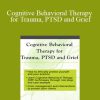
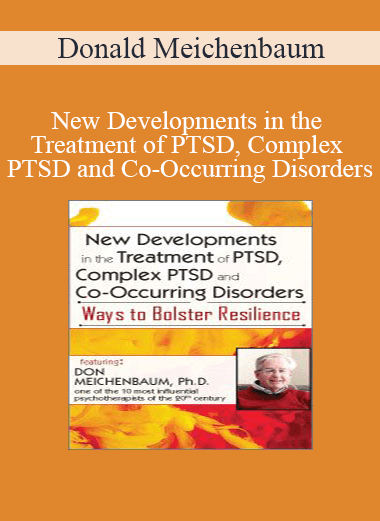
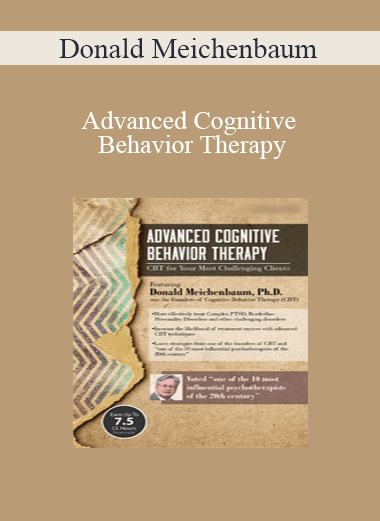
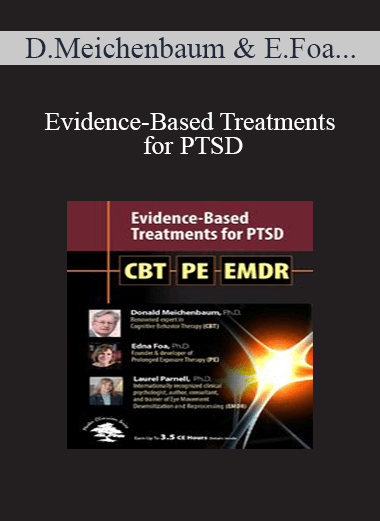
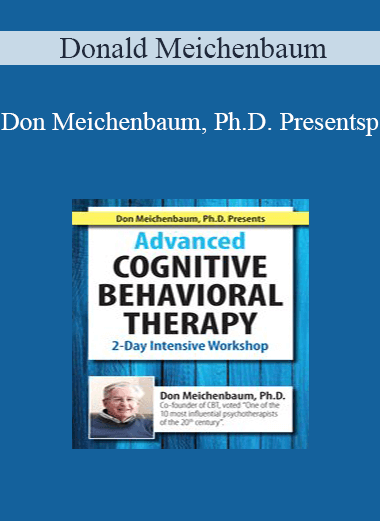
![[Audio Download] EP00 Supervision Panel 5 - Donald Meichenbaum](https://imc.sale/wp-content/uploads/2022/02/Audio-Only-EP00-Supervision-Panel-5-Donald-Meichenbaum-Ph.D.-James-F.T.-Bugental-Ph.D.-Michael-White-B.A.S.W..png)
![[Audio Download] EP05 Conversation Hour 15 - Donald Meichenbaum](https://imc.sale/wp-content/uploads/2022/02/Audio-Only-EP05-Conversation-Hour-15-Donald-Meichenbaum-PhD-1-1.png)
![[Audio Download] EP05 Topical Panel 12 - Research in Psychotherapy - Albert Bandura](https://imc.sale/wp-content/uploads/2022/02/Audio-Only-EP05-Topical-Panel-12-Research-in-Psychotherapy-Albert-Bandura-Ph.D.-Marsha-Linehan-Ph.D.-Donald-Meichenbaum-Ph.D.-John-Gottman-Ph.D..png)
![[Audio Download] EP09 Topical Panel 09 - Cross-Cultural Issues - Jean Houston](https://imc.sale/wp-content/uploads/2022/02/Cross-Cultural-Issues-–-Jean-Houston-Donald-Meichenbaum-and-Derald-Wing-Sue.png)
![[Audio Download] EP13 Topical Panel 03 - Children and Adolescents - John Gottman](https://imc.sale/wp-content/uploads/2022/02/Audio-Only-EP13-Topical-Panel-03-Children-and-Adolescents-John-Gottman-PhD-Donald-Meichenbaum-PhD-and-Mary-Pipher-PhD.png)
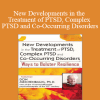
7 reviews for Donald Meichenbaum – New Developments in the Treatment of PTSD, Complex PTSD and Co-Occurring Disorders: Ways to Bolster Resilience
There are no reviews yet.